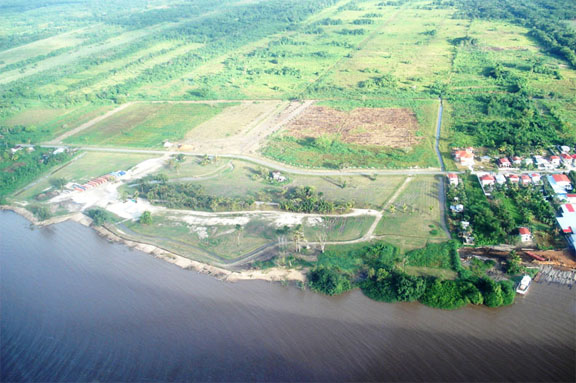In just over 20 months the dream of the country’s leading distributors of Japanese motor vehicles and engineering services of relocating operations outside the capital is scheduled to become a reality. Ming’s Products and Services Ltd will commence a new chapter in its operations when it moves to its new home at Blake, Parika, East Bank Essequibo in October 2014.
In an exclusive interview with Stabroek Business earlier this week, the company’s owner and Chief Executive Officer Stanley Ming outlined a number of reasons why the 22-year-old firm has chosen to put Georgetown behind it and begin anew at a location which he believes is safer, more convenient, less congested and environmentally friendlier.

Ming told Stabroek Business that it was what he saw of the 2005 floods and his lack of any abiding faith in the engineering work that attended the rehabilitation of the sea wall that first triggered his decision to re-site his operations outside the city. And while the one-time People’s National Congress/ Reform Member of Parliament is loathe to decry the capital, he concedes that there is much that is wrong with Georgetown and that it is not only his concerns over flooding that is taking him to Parika. “I can live a healthier life that is less congested, less polluted, less costly. The area [Parika] is cleaner. No rubbish at the side of the road and no big traffic jams,” Ming told Stabroek Business.
The relocation decision acknowledges too that Georgetown’s influence as the centre of the country’s commercial life is beginning to give way to the imperatives of economic activity – like oil and mineral exploration and exploitation and tourism – elsewhere in the country. Ming sees Parika as a fast-rising township, a less costly place to do business and more welcoming than Georgetown. He is keen to make it known that he is not abandoning Georgetown. A small outpost will remain in the Capital. On the other hand, the strategic advantages of the move to Parika are compelling.
Over time Ming appears to have become an advocate for contemplating Region Three and more particularly, Parika, as an option for both living and doing business. Parika, he says, “is the natural gateway to Guyana. If you want to go to a sawmill, a resort or to the hinterland for mining, Parika is the gateway to those destinations,” he says. He boasts of introducing three of the country’s commercial banks to Parika. One of them, he says, has since reported returns in excess of 50 per cent of its projections. He believes that the population of Region Three could grow to up to 100,000 “in five to ten years”.
The new site for Ming’s Products and Services sits on a 325-acre portion of a larger land acquisition just three miles from the Parika Public Road. The complex is named Isika, an Amerindian word that means ‘to give’ and Ming clearly believes that apart from the advantages to be derived for his family and his business, his decision is an example of giving to Guyana.

MPS is the country’s leading importer and distributor of Japanese motor vehicles and machinery and has been best-known over the years for its relationships with the two highly reputable Japanese firms Mitsubishi and Yamaha. Over the years, however, Ming, who has immersed himself in various social causes and in strategic thinking related to various aspects of the development of Guyana, has embraced a broader range of business interests. MPS owns and operates a modern fleet of heavy-duty equipment that includes excavators, backhoe loaders and Caterpillar equipment. Additionally, the firm manufactures its own fibreglass boats and distributes construction and building supplies for three major United States companies, Advance Trading Systems, Tensar Intl Corporation and Crane Materials, USA.
Isika envisages further expansion of MPS’ business operations in directions that reflect the owner’s strategic thinking. Mindful, he says, of the need to retain the company’s skilled work force, Ming is offering the enticement of a housing complex that will offer staff an opportunity to purchase their own homes at the site of the complex. All categories of MPS workers and residents of the community not employed with the company will also be afforded the opportunity of purchasing homes at the site.
The new complex will also include a fibreglass boat-manufacturing complex, a state-of-the-art medical, educational and recreational facility and a processing plant that will engage in agro-processing and distribution of products.
After the floods in 2005, Ming had told his wife Michelle, whose optician’s practice is based in Tiger Bay that the move would have been made by 2015. She headed for Parika ahead of him, providing optical services there twice weekly and doing as much business there as she does during her four days in Georgetown.
As for the future of MPS in its new home, Ming is confident that it will pay dividends. He cites access of a larger workforce as one of the advantages of relocation and while he is confident that the quality of the services which the company offers will result in customer retention he appears equally interested in what he believes are the new markets that will open up. His optimism, he says, is driven by the drift away from Georgetown to communities like Tuschen and Parfait Harmonie. In fact, he believes that much of the house construction taking place in the community where his own new operations are located are a response to his own relocation. And again he issues what he believes is a timely reminder; “Parika is less vulnerable to flooding. It drains by gravity.” Ming believes that settling in a new community will take at least two years, but he says he seeks to put down roots in a community that will provide both new challenges and new experiences and which, in the final analysis, could bring benefits that go far beyond those that accrue to his family and his business.





